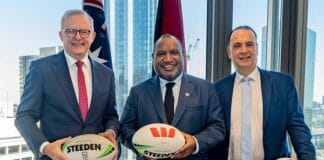The Gillard government’s continuation of the old Rudd and Howard policy of meddling in Fiji’s politics saw the Australian High Commissioner to Fiji, Sarah Roberts, expelled from the country in July.
Since Fiji’s expulsion from the Pacific Islands Forum (PIF) in May 2009—which is dominated by Australia and New Zealand—Fiji’s ruler Commodore Bainimarama has sought other forums to have dialogue with Pacific island nations.
Fiji pushed for a Melanesian Spearhead Group (MSG), consisting of PNG, Solomon Islands and Vanuatu, to endorse Bainimarama’s strategic roadmap for elections in 2014.
However, the Australian government saw this MSG as undermining its influence in the region. High Commissioner Roberts actually campaigned among the MSG member states to stop an MSG “Plus Summit” in Fiji from going ahead, as did the Federal Labor government in Canberra.
The PM of Vanuatu, Edward Natapei, cancelled attending the MSG meeting. Vanuatu is the current MSG chair. Bainimarama believes he made the decision due to pressure from Australia in the form of $66.4 million in aid.
Foreign Minister, Stephen Smith, admitted that Australia approached Melanesian countries “advising them” not to attend the meeting.
The Australian government has said it wants elections in Fiji earlier than 2014—as if has the right to tell Fiji when they should be called. It condemns Bainimarama as a military dictator with no respect for human rights—but its real concern is promoting Australian strategic and business interests.
Australia may be happy with a weak and divided Fijian ruling class so it can step in and intervene at will. A stronger Fijian regime would clash with Australia’s existing economic control and political influence, one it has worked hard to attain, even lobbying Britain to annex Fiji in the 1870s. In 2007, Bainimarama nationalised the Australian-owned Emperor Gold mine.
Bainimarama is promoting Fijian control of business with a new media decree for 90 per cent Fijian ownership of the media in three months time. This will hurt Murdoch’s News Limited’s control of Fiji’s main paper—the Fiji Times.
Undoing racial divisions
In contrast to Fiji’s previous military rulers, Bainimarama is attempting to undo the country’s entrenched racial divisions.
This means undoing years of damage. The electoral system is still based on “communal” rolls, unlike Australia which has universal electoral rolls. In Fiji, a voter can only vote for a member of their own community—Fijian or Indian—with a handful of “open” seats.
This is a divide which Australia has never objected to in Fiji’s history.
Fiji has three coups in 20 years before the fourth, led by Bainimarama. It was effectively a one-party state, based on the indigenous Fijian chiefs, from 1970-1987.
The election of the multi-racial Labour Party’s in 1987 saw the first coup, led by Lt. Colonel Sitiveni Rabuka, with the express aim of shoring up the power of the Fijian chiefs. The chiefs had been promoted by Britain, in a conscious divide-and-rule policy against Indian Fijians.
The Fiji Labour Party won by appealing to indigenous working class Fijians on a class basis, breaking the hold of the Fijian chiefs. Fijian politics since then has been dominated by attempts of the chiefs to shore up their political and economic interests.
When the Labour Party was elected again in 1999, again it was overthrown by a coup by an indigenous Fijian, linked to the chiefs—George Speight.
Bainimarama’s coup has been different from the past three, in that Indian Fijians have not been the target of a racist leader.
The Commodore may be anti-racist, but his project seems to be to create a unified Fijian ruling class that can run the country competently—and not fracture along ethnic lines the minute a clan thinks its business interests are threatened or could be advanced by a coup. Fiji has faced skills and investment capital shortages, with Indians leaving Fiji after the various coups.
But he is increasingly at odds with the Labour Party and its efforts to stand up for Fijian workers across the racial divide. It was initially part of Bainimarama’s interim government but withdrew in 2008. Now Bainimarama has had the Labour Party leader Mahendra Chaudhry, charged with tax evasion and money laundering charges. This comes after the Labour Party called for a referendum on postponing the elections, and criticised the lack of media freedom.
Bainimarama’s has many hurdles to overcome, one of which is Australia’s imperial meddling. But his aim is not to unify the Fijian working class across the racial divide, only its ruling class, so that it can maximise it profits. The Fijian Labour Party and trade union movement need to organise independently of Bainimarama.
Tom Orsag





